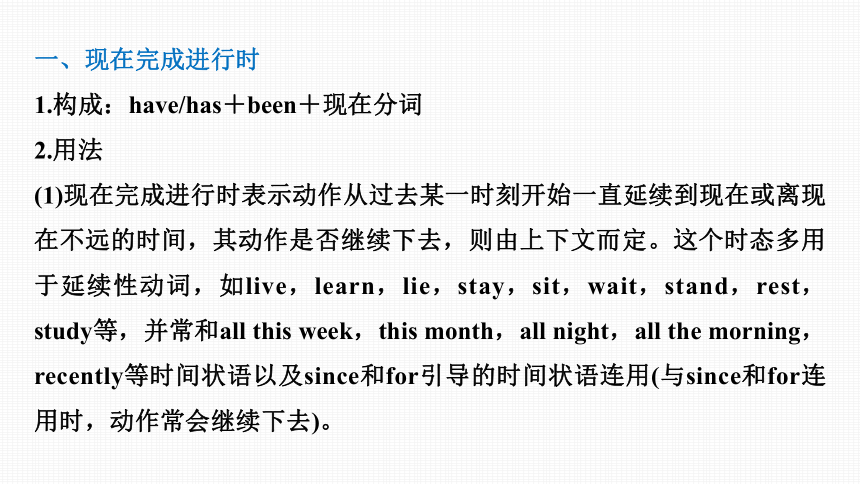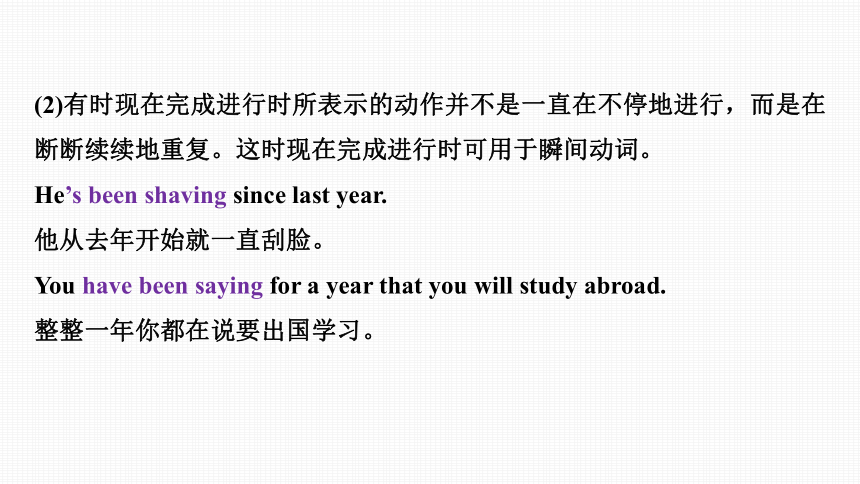人教版(2019)选修三Unit 4 Adversity and Courage Discovering Useful Structures 课件(共18张PPT)
文档属性
| 名称 | 人教版(2019)选修三Unit 4 Adversity and Courage Discovering Useful Structures 课件(共18张PPT) |  | |
| 格式 | pptx | ||
| 文件大小 | 674.7KB | ||
| 资源类型 | 教案 | ||
| 版本资源 | 人教版(2019) | ||
| 科目 | 英语 | ||
| 更新时间 | 2024-04-08 20:06:01 | ||
图片预览







文档简介
(共18张PPT)
Discovering Useful Structures—The present perfect continuous tense
Unit 4
Adversity and courage
语境 感悟
【自主发现】
句①②使用了 ,其构成为 ,表示从过去某时起一直持续到现在的动作。句③④⑤使用了 ,其构成为 。
阅读以下短文,感知加颜色部分,并完成下面的练习
David ①has been looking forward to working in China.So he ②has been learning Chinese in the past two years.Until now he ③has mastered about 100 Chinese words and can communicate with Chinese people in simple Chinese.Besides,his parents ④have bought him some Chinese stories and he ⑤has finished reading two of them.
返 回
现在完成进行时
have/has+been+现在分词
现在完成时
have/has +过去分词
语法 精讲
一、现在完成进行时
1.构成:have/has+been+现在分词
2.用法
(1)现在完成进行时表示动作从过去某一时刻开始一直延续到现在或离现在不远的时间,其动作是否继续下去,则由上下文而定。这个时态多用于延续性动词,如live,learn,lie,stay,sit,wait,stand,rest,study等,并常和all this week,this month,all night,all the morning,recently等时间状语以及since和for引导的时间状语连用(与since和for连用时,动作常会继续下去)。
I have been waiting for an hour and he still hasn’t turned up.
我已经等了一个小时了,可他还没来。
I’ve been writing letters all this morning.
整个上午我一直在写信。
How long have you been living here
你在这里住了多久了?
(2)有时现在完成进行时所表示的动作并不是一直在不停地进行,而是在断断续续地重复。这时现在完成进行时可用于瞬间动词。
He’s been shaving since last year.
他从去年开始就一直刮脸。
You have been saying for a year that you will study abroad.
整整一年你都在说要出国学习。
3.现在完成进行时中时间状语的省略
现在完成进行时在上下文清楚时亦可不用时间状语。这种现在完成进行时多指“刚才”或“近来”发生的动作,一般不再继续,并往往含有一种直接的结果。
You’ve been working too hard.
你工作太辛苦了。(直接结果可能是你一定很累了)
You’ve been smoking again.
你又抽烟了。(暗含结果是你身上有烟味)
4.现在完成进行时的感彩
现在完成进行时和其他进行时态一样,也可以带有感彩。
I have been wanting to meet you for a long time.
和你见面是我盼望已久的事。
Too much has been happening today.
今天发生太多事了。
二、现在完成时与现在完成进行时
现在完成进行时是兼有现在完成时和现在进行时二者基本特点的时态。由于它有现在完成时的特点,所以它可以表示某一动作对现在产生的结果或影响;由于它有现在进行时的特点,所以它也可以表示某一动作的延续性、临时性、重复性、生动性乃至感彩。
现在完成时和现在完成进行时的比较:
1.现在完成进行时可以表示动作的重复,而现在完成时一般不表示重复性。
Have you been meeting him recently
你最近常和他见面吗?
Have you met him recently
你最近见过他吗?
2.现在完成进行时有时含有感彩,而现在完成时一般是平铺直叙。
I have been waiting for you for two hours.
我一直等了你两个小时。(可能表示不满)
I have waited for you for two hours.
我等了你两个小时。(说明一个事实)
3.现在完成进行时强调动作,而现在完成时强调结果。
Who has been eating the oranges
谁一直在吃橘子呀?(还剩余一些)
Who has eaten the oranges
谁把橘子吃了?(强调吃得一个不剩)
4.有些动词不能用于现在完成进行时,但可用于现在完成时。如表示状态的动词:be,have,exist等;表示感情的动词:like,love等;表示感觉的动词:see,hear,know等。
I have liked jazz since I was a teenager.
从青少年起我就喜欢爵士乐了。
I have known her for a long time.
我认识她已经很长时间了。
5.与一段时间连用时可以用现在完成时也可以用现在完成进行时;但与次数连用时只能用现在完成时,不能用现在完成进行时。
It hasn’t rained for six weeks.
已经六个星期没下雨了。
It has been raining since yesterday and it is still raining now.
从昨天起,就一直在下雨,而且现在还在下。
He has rung me up five times since 12 o’clock.
从十二点后,他已经给我打了五次电话。
He has been ringing me up all the morning.
他整个上午一直在给我打电话。
6.这两种时态都可以表示动作的延续,区别在于现在完成进行时更强调动作的延续性,可以说是现在完成时的强调形式。
We have been living here for ten years.
We have lived here for ten years.
我们在这里住了十年了。
7.在没有时间状语的情况下,现在完成进行时表示动作仍在进行,而现在完成时则表示动作到现在已经结束。
The students have been preparing for the exam.
学生们一直在为考试做准备。(还在进行)
The students have prepared for the exam.
学生们为考试做了准备。(已经结束)
返 回
达标检测
Since the winter holiday two years ago,we 1.___________________
(study) hard for the college entrance exam.Two English books 2._______
(finish) and more than 600 words 3.___________________
(memorize).We 4. (look) forward to entering a key university.We 5. (make) adequate preparations.The day we
6. (expect) is approaching.How I wish to be admitted to my dream university!
用所给动词的适当形式填空
返 回
have been studying
have
been finished
have been memorized
have been looking
have made
have been expecting
Discovering Useful Structures—The present perfect continuous tense
Unit 4
Adversity and courage
语境 感悟
【自主发现】
句①②使用了 ,其构成为 ,表示从过去某时起一直持续到现在的动作。句③④⑤使用了 ,其构成为 。
阅读以下短文,感知加颜色部分,并完成下面的练习
David ①has been looking forward to working in China.So he ②has been learning Chinese in the past two years.Until now he ③has mastered about 100 Chinese words and can communicate with Chinese people in simple Chinese.Besides,his parents ④have bought him some Chinese stories and he ⑤has finished reading two of them.
返 回
现在完成进行时
have/has+been+现在分词
现在完成时
have/has +过去分词
语法 精讲
一、现在完成进行时
1.构成:have/has+been+现在分词
2.用法
(1)现在完成进行时表示动作从过去某一时刻开始一直延续到现在或离现在不远的时间,其动作是否继续下去,则由上下文而定。这个时态多用于延续性动词,如live,learn,lie,stay,sit,wait,stand,rest,study等,并常和all this week,this month,all night,all the morning,recently等时间状语以及since和for引导的时间状语连用(与since和for连用时,动作常会继续下去)。
I have been waiting for an hour and he still hasn’t turned up.
我已经等了一个小时了,可他还没来。
I’ve been writing letters all this morning.
整个上午我一直在写信。
How long have you been living here
你在这里住了多久了?
(2)有时现在完成进行时所表示的动作并不是一直在不停地进行,而是在断断续续地重复。这时现在完成进行时可用于瞬间动词。
He’s been shaving since last year.
他从去年开始就一直刮脸。
You have been saying for a year that you will study abroad.
整整一年你都在说要出国学习。
3.现在完成进行时中时间状语的省略
现在完成进行时在上下文清楚时亦可不用时间状语。这种现在完成进行时多指“刚才”或“近来”发生的动作,一般不再继续,并往往含有一种直接的结果。
You’ve been working too hard.
你工作太辛苦了。(直接结果可能是你一定很累了)
You’ve been smoking again.
你又抽烟了。(暗含结果是你身上有烟味)
4.现在完成进行时的感彩
现在完成进行时和其他进行时态一样,也可以带有感彩。
I have been wanting to meet you for a long time.
和你见面是我盼望已久的事。
Too much has been happening today.
今天发生太多事了。
二、现在完成时与现在完成进行时
现在完成进行时是兼有现在完成时和现在进行时二者基本特点的时态。由于它有现在完成时的特点,所以它可以表示某一动作对现在产生的结果或影响;由于它有现在进行时的特点,所以它也可以表示某一动作的延续性、临时性、重复性、生动性乃至感彩。
现在完成时和现在完成进行时的比较:
1.现在完成进行时可以表示动作的重复,而现在完成时一般不表示重复性。
Have you been meeting him recently
你最近常和他见面吗?
Have you met him recently
你最近见过他吗?
2.现在完成进行时有时含有感彩,而现在完成时一般是平铺直叙。
I have been waiting for you for two hours.
我一直等了你两个小时。(可能表示不满)
I have waited for you for two hours.
我等了你两个小时。(说明一个事实)
3.现在完成进行时强调动作,而现在完成时强调结果。
Who has been eating the oranges
谁一直在吃橘子呀?(还剩余一些)
Who has eaten the oranges
谁把橘子吃了?(强调吃得一个不剩)
4.有些动词不能用于现在完成进行时,但可用于现在完成时。如表示状态的动词:be,have,exist等;表示感情的动词:like,love等;表示感觉的动词:see,hear,know等。
I have liked jazz since I was a teenager.
从青少年起我就喜欢爵士乐了。
I have known her for a long time.
我认识她已经很长时间了。
5.与一段时间连用时可以用现在完成时也可以用现在完成进行时;但与次数连用时只能用现在完成时,不能用现在完成进行时。
It hasn’t rained for six weeks.
已经六个星期没下雨了。
It has been raining since yesterday and it is still raining now.
从昨天起,就一直在下雨,而且现在还在下。
He has rung me up five times since 12 o’clock.
从十二点后,他已经给我打了五次电话。
He has been ringing me up all the morning.
他整个上午一直在给我打电话。
6.这两种时态都可以表示动作的延续,区别在于现在完成进行时更强调动作的延续性,可以说是现在完成时的强调形式。
We have been living here for ten years.
We have lived here for ten years.
我们在这里住了十年了。
7.在没有时间状语的情况下,现在完成进行时表示动作仍在进行,而现在完成时则表示动作到现在已经结束。
The students have been preparing for the exam.
学生们一直在为考试做准备。(还在进行)
The students have prepared for the exam.
学生们为考试做了准备。(已经结束)
返 回
达标检测
Since the winter holiday two years ago,we 1.___________________
(study) hard for the college entrance exam.Two English books 2._______
(finish) and more than 600 words 3.___________________
(memorize).We 4. (look) forward to entering a key university.We 5. (make) adequate preparations.The day we
6. (expect) is approaching.How I wish to be admitted to my dream university!
用所给动词的适当形式填空
返 回
have been studying
have
been finished
have been memorized
have been looking
have made
have been expecting
